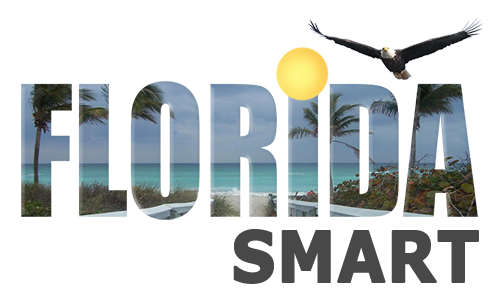Florida, known for its sunshine, sandy beaches, and diverse culture, attracts people from across the globe. While it offers a lifestyle that’s hard to resist, understanding the realities of living and working here is crucial to making an informed decision. From its economic landscape to housing, healthcare, schools, and other lifestyle considerations, here’s a closer look at what life in Florida is really like.
Economy and Financial Considerations
Florida’s business-friendly policies, no state income tax, and access to global markets make it an attractive hub for entrepreneurs and corporations alike.
Navigating Florida’s economy starts with understanding the cost differences between regions as costs vary widely depending on location. Coastal cities like Miami, Naples, and Sarasota are more expensive, with higher housing costs, while many inland areas offer more affordable options. If you’re moving for work, its important to research industries thriving in your desired area, such as tech in Miami or aerospace near Cape Canaveral. For a better cost of living, consider more affordable inland towns or suburbs, where housing and daily expenses are lower.
Tips
- Budget carefully for utilities, especially during the summer months when air conditioning costs peak.
- Take advantage of Florida’s lack of state income tax by setting aside more for savings or investments.
- Plan and know your financial priorities to help you balance the benefits of Florida’s diverse economic opportunities with the costs of living here.
Housing and Real Estate Market
The real estate market in Florida is diverse, catering to a wide range of budgets and preferences. Florida’s housing market can be competitive, so preparation is key. Begin by narrowing down the type of home that suits your needs, whether it’s a condo near the beach, a suburban family home, or a place in an active 55+ community. Work with a real estate agent familiar with the region you’re considering, as they can guide you through pricing, neighborhood amenities, and hurricane safety features like impact windows.
For affordability, look beyond the coastal hotspots and big cities to the outskirts and smaller towns. If buying isn’t feasible, Florida’s rental market has many options, but act quickly, popular rentals are often in high demand.
Housing Options for Different Budgets
Florida offers various programs to assist first-time buyers, including down payment assistance and affordable mortgage options through the Florida Housing Finance Corporation. In addition, many communities feature starter homes in suburban neighborhoods with access to good schools and amenities.
Retirement and 55+ Communities
Florida is famous for its active adult and retirement communities, such as The Villages and Sun City Center, which offer affordable living with amenities like golf courses, fitness centers, and social clubs. But retirement communities are not limited to these areas and can be found statewide with options for all budgets.
Rental Market
For those not ready to buy, Florida’s rental market provides a variety of options. Rent is typically higher in tourist-heavy and coastal cities but more affordable in suburban and rural areas.
Luxury and Waterfront Properties
For buyers with a larger budget, Florida’s real estate market includes high-end properties such as waterfront homes, penthouse condos, and gated communities. And if you have a really large budget, Florida is home to some of the most expensive and luxurious homes in the country.
Cost Considerations
While Florida’s real estate market is diverse, it’s important to budget for additional costs such as property taxes, homeowners insurance, and homeowners association (HOA) fees. In areas prone to hurricanes or flooding, insurance premiums can be higher, so it’s essential to factor this into your overall housing budget.
Job Market and Business Opportunities
To succeed in Florida’s job market, focus on industries thriving in the state, such as tourism, healthcare, aerospace, and tech. Note that Florida wages tend to be lower than the national average so be prepared as you might have to accept a lower income. Also note that this often will be offset by the fact that Florida has no state income tax.
Networking is invaluable, especially in Florida’s vibrant metro areas. Use platforms like LinkedIn, attend industry-specific meetups, and leverage local job boards.
Business Ownership in Florida
If you’re considering starting a business, Florida’s business-friendly policies make it an excellent choice. Research local requirements for permits and licenses, and tap into resources like the Florida Small Business Development Center Network for guidance.
For entrepreneurs, Florida’s lack of a state income tax, competitive corporate tax rates, and access to capital make it one of the most business-friendly states.
Healthcare and Wellness
Florida offers a robust healthcare system that caters to its diverse and growing population, including families, retirees, and working professionals. But it pays to do your homework.
Research hospitals and clinics in your area to ensure access to high-quality care, especially if you have specific health needs. With world-renowned hospitals, specialized medical centers, and a strong emphasis on healthcare innovation, Florida is well-equipped to address a wide range of medical needs.
If you’re retiring, check Medicare coverage options and supplemental plans to cover potential gaps. Medicare plays a significant role in senior care, and Medicaid expansion has been limited compared to other states.
While healthcare costs in Florida can vary, the state’s competitive market helps ensure that residents have access to affordable care. For those without insurance, many counties offer free or low-cost clinics to assist underserved populations.
Many communities offer free or low-cost health screenings, fitness classes, and nutrition workshops, helping residents maintain a healthy lifestyle. Outdoor enthusiasts can also benefit from Florida’s year-round sunshine and parks, which encourage physical activity and mental well-being.
Florida’s healthcare system is well-prepared to respond to emergencies, including hurricanes and other natural disasters. Research emergency procedures in your area and be sure to know where the hospitals and shelters are. Hospitals and healthcare providers have robust disaster plans in place, ensuring continued access to care even during challenging situations.
Education and Schools
For families, navigating Florida’s education system starts with researching schools in your chosen area. Check school district ratings and visit campuses to assess their resources and programs.
Florida also offers a variety of charter and private school options, so explore those if they align better with your child’s needs.
Higher education opportunities are abundant, with universities like the University of Florida and Florida State University leading the pack. If you’re considering advanced education or retraining, take advantage of Florida’s workforce development programs and community colleges, which offer affordable pathways to new careers.
Demographics and Community
Florida’s population is diverse and growing rapidly with a populations estimate (2024) of over 23 million residents.
- Ethnic Diversity: Florida is a melting pot, with large Hispanic, African American, and Caribbean communities, particularly in cities like Miami, Orlando, and Tampa.
- Age Distribution: Florida is famous for its retiree population, but it’s also home to families and young professionals, especially in urban centers.
- Religion: The state has a mix of religious affiliations, with Christianity being the most prevalent. Catholicism is particularly strong due to Hispanic and Caribbean influences, but there are also vibrant Jewish, Muslim, and non-religious communities.
Florida’s diverse population means you can find a community that fits your lifestyle. Whether it’s Miami’s Latin influence, Tampa’s Cuban heritage, or Orlando’s melting pot of cultures, take time to explore different cities and neighborhoods.
Look for events, cultural festivals, or local community groups to meet people and get a feel for the area. Florida’s diversity is also reflected in its food, art, and traditions, so immerse yourself in the local culture to feel at home. Finding a community where you connect is key to thriving in the Sunshine State.
The Political Spectrum
Florida’s political climate can be dynamic and polarizing. Understanding the political leanings of your area can help you feel more engaged and connected. Urban areas like Miami and Orlando lean more progressive, while rural regions often lean conservative. Stay informed by following local news and community discussions, and don’t shy away from participating in civic life through voting or volunteering. Building relationships with neighbors of varying perspectives can help foster a sense of unity despite differences.
Environmental and Lifestyle Realities
Florida’s environment offers beauty but also demands preparation. For hurricanes, create an emergency kit and evacuation plan, and consider flood insurance if you live in a vulnerable area. To manage the heat and humidity, ensure your home has efficient air conditioning and consider outdoor activities early in the morning or late in the evening. Pest control is essential to keep bugs at bay.
Embrace Florida’s natural beauty responsibly by visiting parks, supporting conservation efforts, and learning how to coexist with local wildlife. Preparedness and mindfulness will allow you to enjoy the best of Florida’s outdoor lifestyle.











